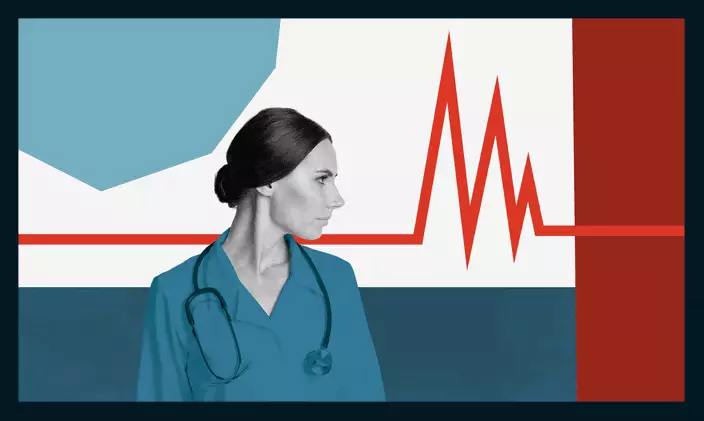What is a nurse practitioner?

Written by Michael Feder

This article was reviewed by Raelene Brooks, Dean, College of Nursing.

The United States is experiencing a physician shortage . American Medical Association President Jesse M. Ehrenfeld, MD, MPH, cites “critical strains” on physicians and considers “an urgent crisis … hitting every corner of this country.” The physician shortage can limit access to vital healthcare for millions of Americans.
How can healthcare professionals — including nurses — reduce the impact of the shortage?
What is a nurse practitioner role in the physician shortage?
Nurse practitioners fulfill a vital role in the healthcare system, but what is a nurse practitioner (NP)? An NP is an advanced practice registered nurse (APRN) who has completed additional training beyond that required of registered nurses (RNs). They can provide either primary or specialty care, depending on their focus, education and experience.
NPs work with patients of all ages and in various settings, including hospitals, clinics and private practices. NPs have extensive training that enables them to provide many of the same services as physicians, often at a lower cost . Depending on the state, they may also be able to practice independently without physician oversight, further increasing their ability to meet patients’ needs. In fact, an NP might be a patient’s primary healthcare provider.
NPs undergo training to perform various duties , including:
- Conducting physical exams
- Ordering and interpreting diagnostic tests
- Diagnosing acute and chronic conditions
- Prescribing medications
- Providing health education
- Making necessary specialist referrals
Becoming a nurse practitioner involves substantial training and certification, including active licensure as an RN, a graduate degree in nursing and advanced clinical training. Read on to learn more about the professionals, including their daily responsibilities, practices and differences from other healthcare professionals.
What is a nurse practitioner vs. other practitioner roles?
While NPs can share many of the same responsibilities as physicians or physician assistants, critical differences between professions go beyond experience and salary.
What is a nurse practitioners vs. a doctor?
Even though NPs and physicians have overlapping responsibilities, key differences between the roles include education, training and scope of practice.
Medical doctors must complete a four-year undergraduate degree, four years of medical school and three to seven years of residency. NPs typically need a bachelor’s degree in nursing, a master’s or doctor of nursing practice degree and to pass an NP board exam.
While NPs and medical doctors can diagnose conditions, prescribe treatments and act as primary care providers, the scope varies for NPs based on state laws. In some states, NPs can practice independently; in others, they must have a collaborative agreement with a physician.
Because of their shorter training period, NPs can often cost less to employ than medical doctors . This can help make healthcare more affordable and accessible in underserved areas.
What is a nurse practitioner vs. a physician assistant?
NPs and PAs (physician assistants) provide patient care services, but there are big differences in their education, training, practice model and areas of specialization.
Compared with the nursing background of NPs, which emphasizes a holistic approach to patient care, PAs usually focus on a disease-centered medical model.
To illustrate this difference, look at a diabetes diagnosis. A physician or PA might focus on managing the illness through medication, whereas an NP will try to understand the patient’s community, diet and lifestyle as well. Does diabetes run in the family? Are there other ways, such as diet and exercise, to mitigate the effects of the disease? Understanding this will help them diagnose, educate and treat patients for their diseases.
Most PAs hold a master’s degree in physician assistant studies . Their education typically mirrors that of doctors, focusing on diagnosis and treatment, and the scope of care is greater. For example, NPs cannot provide surgical care, but physician assistants who work with surgeons may, for example, be able to close incisions and perform duties before, during and after surgery.
Areas of specialization and practice can overlap between NPs and PAs. NPs often serve specific populations like pediatrics, women’s health, mental health and older adults, while PAs also work in areas such as family medicine, emergency medicine and psychiatry.
What is a nurse practitioner vs. a registered nurse?
While NPs and RNs are types of nurses who play crucial roles in patient care, NPs have more education and responsibilities than RNs.
RNs usually hold a diploma, associate degree or bachelor’s degree in nursing. After completing the degree or program, they must pass the National Council Licensure Examination (NCLEX-RN) to become licensed RNs.
Although NPs all begin as RNs they must go on to complete a master’s or doctoral degree and additional clinical training. They must also pass a national certification exam in their specialty .
The responsibilities of NPs and RNs differ significantly. Consider the following job duties of RNs:
- Provide direct patient care
- Administer medications
- Monitor patient progress
- Educate patients and families
NPs have a broader scope of practice. They can diagnose and treat acute or chronic conditions, prescribe medication and perform certain procedures.
RNs and NPs can both work in different medical settings and gain experience in various fields. RNs might specialize in critical care or trauma, for example, and NPs can specialize in areas like family practice, pediatrics, adult gerontology, mental health and women’s health, among others.
Day-to-day responsibilities
What is a nurse practitioner's day like? Like any nursing-focused profession, the answer depends on where they practice and what they specialize in. Generally speaking, however, NPs often perform the following tasks :
- Take medical histories and conduct exams
- Diagnose acute and chronic illnesses
- Develop treatment plans and prescribe medication
- Educate their patients on health promotion
Remember, the scope of an NP’s practice can vary based on their location, autonomy and specialty.
Types of nurse practitioners
While not exactly among the many related but alternative careers to nursing, working as an NP does offer a discrete professional experience. That’s especially true if you want to specialize in a particular branch of care. Some focus on family medicine, while others might devote their practice to pediatrics. Other specialties include psychiatric and mental health care, acute care and neonatal care.
NPs specialize in particular areas of focus and their education is tailored to their chosen focus. Let’s walk through a couple of specialties for NPs below.
Family nurse practitioner (FNP)
FNPs focus on providing care for patients of all ages throughout their lives. That includes holistic care, disease prevention, counseling and more. FNPs often act as advocates who help their patients navigate the healthcare system, and they can coordinate care among specialists or other health providers. The role of an FNP can vary widely, depending on the state in which they practice and the healthcare setting they choose. Some FNPs may choose to work in a busy physician’s office, for example, while other FNPs dedicate their careers to caring for patients in rural areas.
Psychiatric mental health nurse practitioner (PMHNP)
These NPs focusing on psychiatric mental health help patients manage their mental health conditions with therapy and medication. Known as PMHNPs, these professionals conduct comprehensive psychiatric evaluations to identify mental health issues, including substance use disorders, depression and anxiety. They’re also able to provide various forms of crisis intervention, including psychotherapy and medications.
Their education focuses on disorder assessment and prevention, self-care management and psychotherapeutic intervention, but it also emphasizes the importance of identifying possible physical causes behind mental health disordorders.
For example hyperthyroidism can appear as substance abuse or even a mental health disorder. Having a solid understanding of physical health factors and assessing for those first can help PMHNPs provide more effective and accurate care.
What is a nurse practitioner salary?
Nurse practitioner salaries can vary based on many factors, including location, experience and specialty. As of May 2022, those who worked in hospitals and outpatient care centers earned more than NPs who worked in doctor offices or with other health practitioners. As of May 2023, nurse practitioners salaries ranged between $95,530 and $211,820 , with a median wage of $129,480, according to the U.S. Bureau of Labor Statistics.
Salary ranges are not specific to students or graduates of University of Phoenix. Actual outcomes vary based on multiple factors, including prior work experience, geographic location and other factors specific to the individual. University of Phoenix does not guarantee employment, salary level or career advancement. BLS data is geographically based. Information for a specific state/city can be researched on the BLS website.
Steps to become a nurse practitioner
The educational pathways to becoming a nurse practitioner are relatively straightforward. It all starts with earning your RN license.
1. If you’re an RN with an associate degree or nursing diploma, you’ll need to earn a Bachelor of Science in Nursing (BSN). BSNs strengthen relevant skills and help continue your progress toward graduate-level coursework.
2. If you already have a bachelor’s degree in an unrelated field and wish to earn your Master of Science in Nursing, a nurse bridge program could be right for you.
3. In addition to the standard degree pathways, every prospective NP must successfully complete supervised clinical hours.
4. After that, you’ll need to pass your state’s licensing exam and earn the appropriate certification(s) from the American Academy of Nurse Practitioners Certification Board
or the American Nurses Credentialing Center
(each requires periodic renewal).
What is a nurse practitioner's educational program?
What is a nurse practitioner degree program? Prospective NPs can leverage their existing skills and competencies to grow their education in one of University of Phoenix’s two nurse practitioner programs:
- Master of Science in Nursing/Family Nurse Practitioner
- Master of Science in Nursing/Psychiatric Mental Health Nurse Practitioner
To learn more about online nursing degrees at UOPX — including those that lead to a fulfilling career as a nurse practitioner — contact University of Phoenix.

ABOUT THE AUTHOR
A graduate of Johns Hopkins University and its Writing Seminars program and winner of the Stephen A. Dixon Literary Prize, Michael Feder brings an eye for detail and a passion for research to every article he writes. His academic and professional background includes experience in marketing, content development, script writing and SEO. Today, he works as a multimedia specialist at University of Phoenix where he covers a variety of topics ranging from healthcare to IT.

ABOUT THE REVIEWER
Dr. Raelene Brooks, dean of the College of Nursing, has been a registered nurse for more than 25 years and practiced extensively in the areas of ICU, trauma and critical care. Her publications include a focus on nursing education, critical care and diversity, equity and inclusion. She is a leader in creating, guiding and launching innovative curriculum.
This article has been vetted by University of Phoenix's editorial advisory committee.
Read more about our editorial process.


